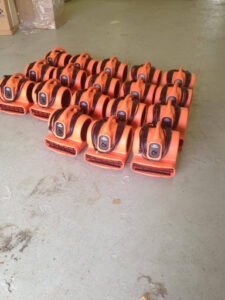Preparing for Hurricanes: A Guide by 911 Restoration of San Fernando Valley
Preparing for Hurricanes in San Fernando Valley
As hurricane season approaches, residents of Los Angeles need to be prepared for the potential impact of these powerful storms. While Los Angeles isn’t known for frequent hurricanes, the possibility of one hitting the region, like Hurricane Hilary, cannot be ruled out. In this blog post, we’ll discuss how hard Hurricanes hit Los Angeles, what to expect with hurricanes in the area, where hurricanes typically hit in Los Angeles, how to prepare for hurricanes, and where the worst conditions occur during a hurricane.

mold equipment
How Hard is Hurricane Hilary Hitting Los Angeles?
Hurricane Hilary is expected to impact parts of Southern California, including Los Angeles. While the intensity and impact of the hurricane can vary, it’s essential to stay informed through official weather channels to understand how hard the hurricane is hitting the region. Keep an eye on local news, weather forecasts, and government alerts to stay updated on the storm’s progress.
What to Expect with Hurricanes in Los Angeles?
Hurricanes in Los Angeles can bring heavy rainfall, strong winds, flooding, and potential power outages. While they may not be as frequent or severe as in other hurricane-prone areas, being prepared is crucial. Even a relatively mild hurricane can cause significant disruptions and damage. It’s important to remember that preparedness is the key to minimizing the impact of these storms.
Where Do Hurricanes Hit in Los Angeles?
Hurricanes in Los Angeles primarily affect coastal areas and regions near the Pacific Ocean. Neighborhoods along the coast and low-lying areas are more vulnerable to storm surges and flooding. The San Fernando Valley, an inland region, can also experience some effects of hurricanes, including heavy rainfall and gusty winds.
What Parts of California Do Hurricanes Hit?
While California is not as prone to hurricanes as other coastal states, the southern parts of the state, including Los Angeles, can occasionally be affected. The warm waters of the Pacific Ocean can fuel these storms, bringing them closer to the coast. However, the frequency and intensity of hurricanes hitting California are generally lower than in more hurricane-prone regions.
How Do You Prepare for Hurricanes in Los Angeles?
- Stay Informed: Monitor weather forecasts and official updates from meteorological agencies. Have a battery-powered weather radio to receive alerts, especially if power is lost.
- Create an Emergency Kit: Prepare a well-stocked emergency kit containing essentials like water, non-perishable food, flashlights, batteries, a first aid kit, and any necessary medications.
- Secure Your Home: Trim trees, clear gutters, and secure outdoor furniture to minimize potential hazards during strong winds. Consider reinforcing windows and doors to prevent damage.
- Develop an Evacuation Plan: Know your evacuation routes and have a plan in place for you and your family. Familiarize yourself with nearby shelters and their locations.
- Protect Important Documents: Keep important documents like insurance policies, identification, and medical records in a waterproof container.
- Stay Connected: Keep your mobile devices charged and consider having backup power sources available. Communicate your plans with family members and friends.
Where Are the Worst Conditions in a Hurricane?
The worst conditions during a hurricane typically occur in areas close to the coastline. Coastal regions are most susceptible to storm surges, flooding, and high winds. Low-lying areas can experience severe flooding, which poses a significant danger to residents and properties. It’s crucial to heed evacuation orders and stay away from flood-prone areas to ensure personal safety.
While hurricanes hitting Los Angeles might not be as frequent or intense as in other parts of the country, it’s still essential to be well-prepared. By staying informed, creating an emergency plan, and taking proactive measures to secure your home and belongings, you can minimize the potential impact of these storms. Remember, the safety of you and your loved ones should always be the top priority during hurricane season.
Call our IICRC certified specialist today.


